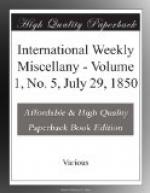That the express had ridden hard was evident from the distressed condition of his horse; and the intelligence he brought deranged my father’s plans entirely. Any attempt either to proceed or to return, as it appeared, would be hazardous alike; and nothing remained but to halt where he was, until more certain information touching the rebel operations should enable him to decide which would be the safest course of action to pursue. He did not communicate the extent of his apprehensions to the family,—affected an air of indifference he did not feel,—introduced himself to the commanding officer on parade, and returned to the inn in full assurance that, in conferring a commission on a man so utterly ignorant of the trade he had been thrust into as Captain —– appeared to be, “the King’s press had been abused most damnably.”
The Colonel had a singular quality,—that of personal remembrance; and even at the distance of years he would recall a man to memory, even had the former acquaintance been but casual. Passing through the inn yard, his quick eye detected in the ostler a quondam stable-boy. To avoid the consequences attendant on a fair riot which had ended, “ut mos est,” in homicide, the ex-groom had fled the country, and, as it was reported and believed, sought an asylum in the “land of the free” beyond the Atlantic, which, privileged like the Cave of Abdullum, conveniently flings her stripes and stars over all that are in debt and all that are in danger. Little did the fugitive groom desire now to recall “lang syne,” and renew a former acquaintance. But my father was otherwise determined; and stepping carelessly up, he tapped his old domestic on the shoulder, and at once addressed him by name.
The ostler turned deadly pale, but in a moment the Colonel dispelled his alarm.
“You have nothing to apprehend from me, Pat. He who struck the blow, which was generally laid to your charge, confessed when dying that he was the guilty man, and that you were innocent of all blame beyond mixing in the affray.”
Down popped the suspected culprit on his knees, and in a low but earnest voice he returned thanks to heaven.
“I understood you had gone to America, or I would have endeavored in some way to have apprised you, that a murderer by report, you were but a rioter in reality.”
“I did go there. Colonel, but I could not rest. I knew that I was innocent: but who would believe my oath? I might have done well enough there; but I don’t know why, the ould country was always at my heart, and I used to cry when I thought of the mornings that I whipped in the hounds, and the nights that I danced merrily in the servants’ hall, when piper or fiddler came,—and none left the house without meat, drink, and money, and a blessing on the hand that gave it.”
“What brought you here, so close to your former home, and so likely to be recognized?”
“To see if I couldn’t clear myself, and get ye’r honor to take me back. Mark that dark man! He’s owner of this horse. Go to the bottom of the garden, and I’ll be with you when he returns to the house again.”




